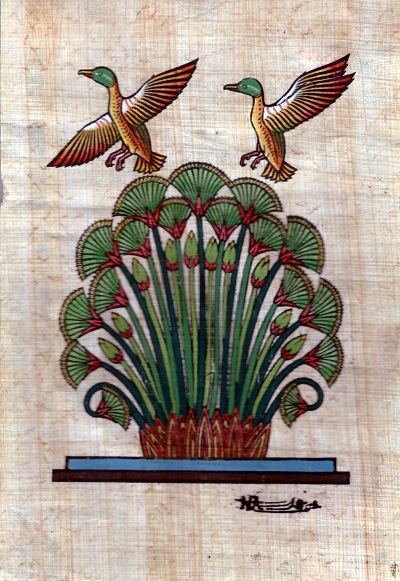by E. A. Bourland
This is a story from the land of the sun, which turned for thousands of years to the bosom of its river, before Apep destroyed both river and land — destroyed all. The people of that land called their river the Great Mother, and the sun the Great Father. Their land they called Kemet, which means the Land of the Black Earth, and their capital city was Memphis, which means the City of the White Walls.
It was a difficult time. Over the years of generations, the waters of the Great Mother had receded. The winter rains were meager, and the summer floods on which the farmers relied had gradually disappeared. Every day was desolate and hot, and in the middle of the day the punishing sun seemed to burn all life from the land. A crocodile yanked a scrawny jackal into the muddy water. A hippo bawled in a dry hollow, its broad back covered in dust. The sycamores that lined the river, which used to bloom in adoration of the Great Mother, now drooped in exhaustion. And the barley and flax died in dry fields. But droughts come and go, and this is not the story of drought and a people’s suffering, but a story of a master chef who remembered, nearly too late and at risk of his life, his passionate love for his wife.
You see, even as famine afflicted his people, the great emperor Djoser kept a famous table, arrayed with fruits, fowl, and game of the countryside. He required his dinners to be prepared to perfection and served without fail in a graceful but exacting ceremony. If any part of the dinner or its presentation was deficient, the penalty was both congruous and severe. A chef who roasted quail for seven heartbeats too long was himself basted with spices, and staked in the desert to roast until he was evenly cooked: so should the quail have been. A hungry food taster who with unseemly gusto assayed the flank of ibex was starved for seven weeks until he died. A cupbearer who spilled a goblet of Elephantine wine was . . . but let us not be horrid. Priests aver it is the burden of deities to see all, remember all. If that is so, then let these barbarities pass to the deities’ endless keeping. Amen.
A detachment of lesser chefs and servers, recruited from every town and village, resided in an auxiliary house on the grounds of the royal demesne. Their task was to prepare the emperor’s meals throughout the day. The master chef lived in his own home in a nearby neighborhood, and his exclusive duty was the preparation of the emperor’s dinner every evening. This master chef was a meticulous and devout man who, over twenty-five years of service to his master, had never made a mistake in any dinner he prepared. He was able to prepare the finest meals using the meanest of provisions, and many said he was blessed by the deities. Of course, the emperor treasured this man, and was disappointed to see that, after twenty-five years of faultless service, his chef was beginning to show signs of fatigue. The dinners he prepared were still perfect, and perfectly presented, but the chef was glum, and muttered to himself, and ground his teeth, and sometimes (when he thought himself unobserved) wiped away a tear.
One day, when the lid was lifted from the emperor’s dinner, the emperor observed in the middle of his spiced fish a lone floating hair, and it was in this way that he knew his chef, his devoted servant of twenty-five years, wished to commit suicide. He tossed the fish aside, ordered the execution of the server who had lifted the lid to reveal the unsightly food, and ordered the chef brought before him in the Solar Chamber. There, while the guards with their spears stood motionless, and blues of evening swam on the walls, he regarded the chef in silence and the chef stood quietly, his head down. The emperor sighed.
“Why?” he said, simply.
“My emperor who is my deity,” said the chef. “The rising sun sings your glory –“
The emperor gestured impatiently. “Answer me.”
The chef began again, “Oh living deity who surmounts the undeserving earth –“
The emperor said, “You will die by excruciation if you waste my time further. Faithful servant, we are friends in a way. Now, empty your heart to me.”
The chef said, “My wife has been seduced by another man, though she denies it. I am despondent to such a degree that I can no longer do my proper work as your master chef. I beg of you, solar emperor, please quickly end my miserable –“
But the emperor silenced him with an omnipotent look and was already speaking to his vizier and within minutes the woman was brought into the evening-blue Solar Chamber. He regarded her with his wise gaze.
The woman looked in his all-powerful eyes and then said, quite simply, “Yes.”
She cried and bowed her head.
The emperor said, “It is easily resolved. The man who has seduced you shall be executed. You will return to your husband.”
He turned to the chef. “And you will take your wife back and continue to prepare my dinners. There, it is done.”
But the chef and his wife just wept.
The wife said, “Oh emperor, the truth of the matter is, I adore my lover. Please do not execute him. Rather, banish us together and we will never trouble you, but every day shall sing your praises in distant lands as a merciful and wise emperor.”
She turned to the chef and said, “I am sorry it has come to this.”
The chef said to the emperor, “Exalted emperor, as your limitless sagacity no doubt perceives, there is no remedy. My wife loves another. Not even deities can change the heart.”
The emperor said, “We shall see about that. Woman, recite the name of your seducer.”
She recited, while the chef grimaced and shuddered.
The emperor said, “I know him. A poet. There are times when I assume an incognito, that I might go among my people; sometimes I have gone to the public house to hear the performances there; and there I have heard him who is your seducer recite his poems. A fatuous gallant, though imposing in his figure. Woman, why have you permitted this very good-looking yet unworthy man to seduce you?”
The woman said, “My emperor, he is a fine poet, and a writer of dramatic plays. He has little money, but his passion is infinite, and his poems and stories come from his heart. And,” she said, “though his cooking is not fancy, when he cooks, he cooks for me.”
The emperor said to the chef, “What was the last meal you prepared for your wife?”
The chef said, “Emperor, in the beginning of our marriage, I cooked meals for her often. But that was a long time ago. These days it is not my habit to cook for my wife. The devotion of my brain and my two hands has been to prepare meals, specifically dinner, only for you. And this preparation, and the planning thereof, requires all of my time.”
While the chef spoke, the woman stood quietly, looking down, her arms at her sides.
The emperor said, “I see. Chef, it is apparent to me that the cause of your wife’s infidelity is, in the main, yourself . . . and, in part, me, for keeping you so busy. Listen, now. You shall prepare one meal every day for your wife, and it shall be the morning meal, and your own kitchen shall be provisioned from my own larder, so that there shall always be fine viands available to you. Further, your wife is a woman, a human person like yourself. You shall see to it that, now and then, you satisfy her sensually.”
He said to the woman, “What do you like to eat for breakfast?”
The woman said modestly, “I like two hen’s eggs mixed with cheese curdled from goat’s milk. And perhaps a bit of porridge with fruit. And a little cup of beer. I like that very much.”
The emperor said, “That sounds fine. Chef, your first occupation every day shall be to prepare for your beloved wife this breakfast that she prefers.”
From his cedar throne he looked down on them. He said, “The two of you shall stay married. As for this seducer who has caused so much trouble . . . I have decided that he shall live on,” he exhaled thoughtfully, “in his poems and stage plays, should anyone care to read them.”
The woman cried out, covering her face.
The emperor said, “Woman, in time you will forget your lover, and in your later years you will be thankful for your comfortable life. Passion is temporary. A perfect meal is timeless. I remember more perfectly than the most desirable caresses every meal your husband has prepared for me.”
The woman sobbed. The chef sobbed, too, even more forcefully, as though crying for the fate of his wife’s seducer.
The emperor said, “Enough. It is done. My vizier informs me the seducer is already delivered to his doom. He has been, how to say gently, unmanned; and his tongue has been torn out with blazing tongs; presently, as he expires, an examiner reads aloud to him from a manuscript of his own — your lover’s — poems. The poems are execrable. They are sincere. He recites them — rather, used to recite them — in a breathy, anxious tone. His execution is a public service. Well, the hour grows late, and I am going to poke around for some dinner. Both of you go home now. No, enough; go now! You should not disagree with me. It is bad for your health.”
They left the emperor’s palace and went out into the cool night. They crossed the gilded courtyard, with its road of jewels, its walls of foliage and roof of stars, and began their descent of the Emperor’s Stairway — the magnificent and colossal stairway of nine hundred steps — one hundred steps for each of the nine deities of the Ennead. Down they stepped, carefully, laboriously, from the majestic height of the splendid night-blue palace, down, down, down to the grimy world below. Foot lamps threw shadows, the stars rolled in their river, and the night was quiet. To the chef’s surprise, his wife took his hand.
“I do not want you to fall,” she said. “Do you see what I had to do? I had to fall in love with another to reclaim my marriage to you.”
The chef said, “You nearly got us both killed. You broke my heart.”
“I think the saying goes, it is easy to die and difficult to love.”
The chef said, “What about your heart?”
She cried, holding his hand. She wiped her face and sighed several times. They reached the bottom of the steps, and finally left the palace grounds, and walked in the road among the beggars and piles of refuse. In a while she said, “The emperor said you were to satisfy me sensually. Do you still find me desirable, even after so many years of marriage?”
The man fumbled, “Well, of course I desire you. You are good-natured most days, and well-favored of figure. The beer you brew is better than most, and you are a decent contriver of housekeeping . . . oh, I do not know what I am saying. I am still frightened out of my wits.”
In the high speech he said, “The deities know I adore thee.”
She shushed him, and held his hand, and they walked. But in a while, he said angrily, “You knew he would be killed. Yet you weep for him. I do not understand you.”
She said, “I am a woman in a world of violent men.” He watched her, still angry, but she shrugged.
She said, “The emperor, may the stars shout his name, is wrong. Neither you nor he was ever responsible for my infidelity, or my fidelity, in the slightest way. I knew exactly what I was doing and you both must live with it. Here, we are home.”
In their doorway she smiled at him. The sorrow lingering in her face elevated her smile to a vision of loveliness, so it seemed to him. He said something useless which she ignored. Then he did not speak, and they went inside their home. She said, “Let us pray to the deities and give thanks for our marriage.”
# # #






Be First to Comment